
Amsterdam is the capital and most populated city of the Netherlands. It has a population of 921,402 within the city proper, 1,457,018 in the urban area and 2,480,394 in the metropolitan area. Located in the Dutch province of North Holland, Amsterdam is colloquially referred to as the "Venice of the North", for its large number of canals, now a UNESCO World Heritage Site.

Hilversum is a city and municipality in the province of North Holland, Netherlands. Located in the heart of the Gooi, it is the largest urban centre in that area. It is surrounded by heathland, woods, meadows, lakes and smaller towns. Hilversum is part of the Randstad, one of the largest conurbations in Europe, and the Amsterdam metropolitan area; it is about 22 km southeast of Amsterdam's city centre and about 15 km north of Utrecht.
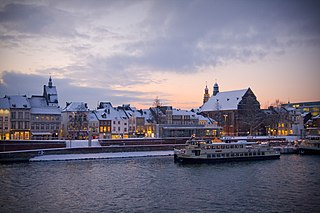
Maastricht is a city and a municipality in the southeastern Netherlands. It is the capital and largest city of the province of Limburg. Maastricht is located on both sides of the Meuse, at the point where the Jeker joins it. Mount Saint Peter (Sint-Pietersberg) is largely situated within the city's municipal borders. Maastricht is adjacent to the border with Belgium and is part of the Meuse-Rhine Euroregion, an international metropolis with a population of about 3.9 million, which includes the nearby German and Belgian cities of Aachen, Liège, and Hasselt.

The Netherlands, informally Holland, is a country located in Northwestern Europe with overseas territories in the Caribbean. It is the largest of the four constituent countries of the Kingdom of the Netherlands. The Netherlands consists of twelve provinces; it borders Germany to the east and Belgium to the south, with a North Sea coastline to the north and west. It shares maritime borders with the United Kingdom, Germany, and Belgium. The official language is Dutch, with West Frisian as a secondary official language in the province of Friesland. Dutch, English, and Papiamento are official in the Caribbean territories.

While recreational use, possession and trade of non-medicinal drugs described by the Opium Law are all technically illegal under Dutch law, official policy since the late 20th century has been to openly tolerate all recreational use while tolerating possession and trade under certain circumstances. This pragmatic approach was motivated by the idea that a drug-free Dutch society is unrealistic and unattainable, and efforts would be better spent trying to minimize harm caused by recreational drug use. As a result of this gedoogbeleid, the Netherlands is typically seen as much more tolerant of drugs than most other countries.

De Wallen is the largest and best known red-light district in Amsterdam. It consists of a network of alleys containing approximately 300 one-room cabins rented by prostitutes who offer their sexual services from behind a window or glass door, typically illuminated with red lights and blacklight. Window prostitution is the most visible and typical kind of red-light district sex work in Amsterdam.

Prostitution in the Netherlands is legal and regulated. Operating a brothel is also legal. De Wallen, the largest and best-known Red-light district in Amsterdam, is a destination for international sex tourism.
Recreational drug tourism is travel for the purpose of obtaining or using drugs for recreational use that are unavailable, illegal or very expensive in one's home jurisdiction. A drug tourist may cross a national border to obtain a drug that is not sold in one's home country, or to obtain an illegal drug that is more available in the visited destination. A drug tourist may also cross a sub-national border to do the same, as in cannabis tourism, or purchase alcohol or tobacco more easily, or at a lower price due to tax laws or other regulations.
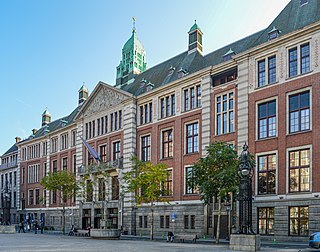
Euronext Amsterdam is a stock exchange based in Amsterdam, the Netherlands. Formerly known as the Amsterdam Stock Exchange, it merged on 22 September 2000 with the Brussels Stock Exchange and the Paris Stock Exchange to form Euronext. The registered office of Euronext, itself incorporated in the Netherlands a public limited company, is also located in the exchange.

The High TimesCannabis Cup is a cannabis festival sponsored by High Times magazine. The event features judges from around the world who sample and vote for their favorite marijuana varieties, with cups (trophies) being awarded to the overall winner in the cannabis variety competition. Since 1997, the Cannabis Cup festival has hosted induction ceremonies for the Counterculture Hall of Fame.

In the Netherlands, coffeeshops are a type of cannabis retail outlet, establishments where the sale of cannabis for personal consumption by the public is tolerated by the local authorities.
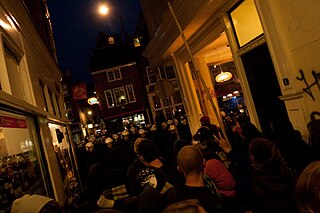
The Dutch squatting ban refers to the law introduced on 1 October 2010, under which squatting in the Netherlands became de jure illegal. Criminalization had first been proposed in the 1970s, but was opposed by the Council of Churches. In 2006, a new plan was proposed and backed by parties including VVD and PVV. When the new law was introduced, squatters occupied the former head office of the fire brigade and there were riots in Amsterdam and Nijmegen. In 2011, the Supreme Court of the Netherlands ruled that the legally forced end of squatting can only occur after an intervention of a judge. Between October 2010 and December 2014, 529 people were arrested for the act of occupying derelict buildings, in 213 separate incidents as a result of which 39 people were jailed.

Minors and the legality of cannabis is one of the issues around the legalisation of cannabis, with most jurisdictions placing strict age limits in a similar way as is done with the drinking age for alcohol.
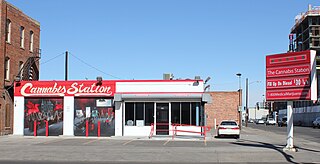
Cannabis dispensaries in the United States or marijuana dispensaries are a type of cannabis retail outlet, local government-regulated physical location, typically inside a retail storefront or office building, in which a person can purchase cannabis and cannabis-related items for medical or recreational use.

A cannabis retail outlet is a location at which cannabis is sold or otherwise dispensed, either for recreational or for medical use.
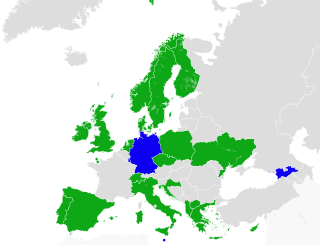
Cannabis in the Netherlands is illegal, but is decriminalised for personal use. Recreational consumption of the drug is tolerated, and it is available in coffeeshops.

We Are Here is a collective of migrants based in Amsterdam, the Netherlands, which campaigns for human rights for its members and all undocumented migrants. The asylum seekers have in many cases had their applications to remain in the Netherlands denied but they either cannot go back or refuse to return to their country of origin. They demand access to social services such as medical care and housing. The group formed in 2012 and by 2015 contained over 200 migrants from around 15 countries.

Squatting in the Netherlands is the occupation of unused or derelict buildings or land without the permission of the owner. The modern squatters movement began in the 1960s in the Netherlands. By the 1980s, it had become a powerful anarchist social movement which regularly came into conflict with the state, particularly in Amsterdam with the Vondelstraat and coronation riots.
The Grass Company is a company in North Brabant, Netherlands that operates four coffeeshops in the cities of 's-Hertogenbosch and Tilburg. The Grass Company was the first company to open a coffeeshop in the south of the Netherlands combining cannabis sales with restaurants.
















